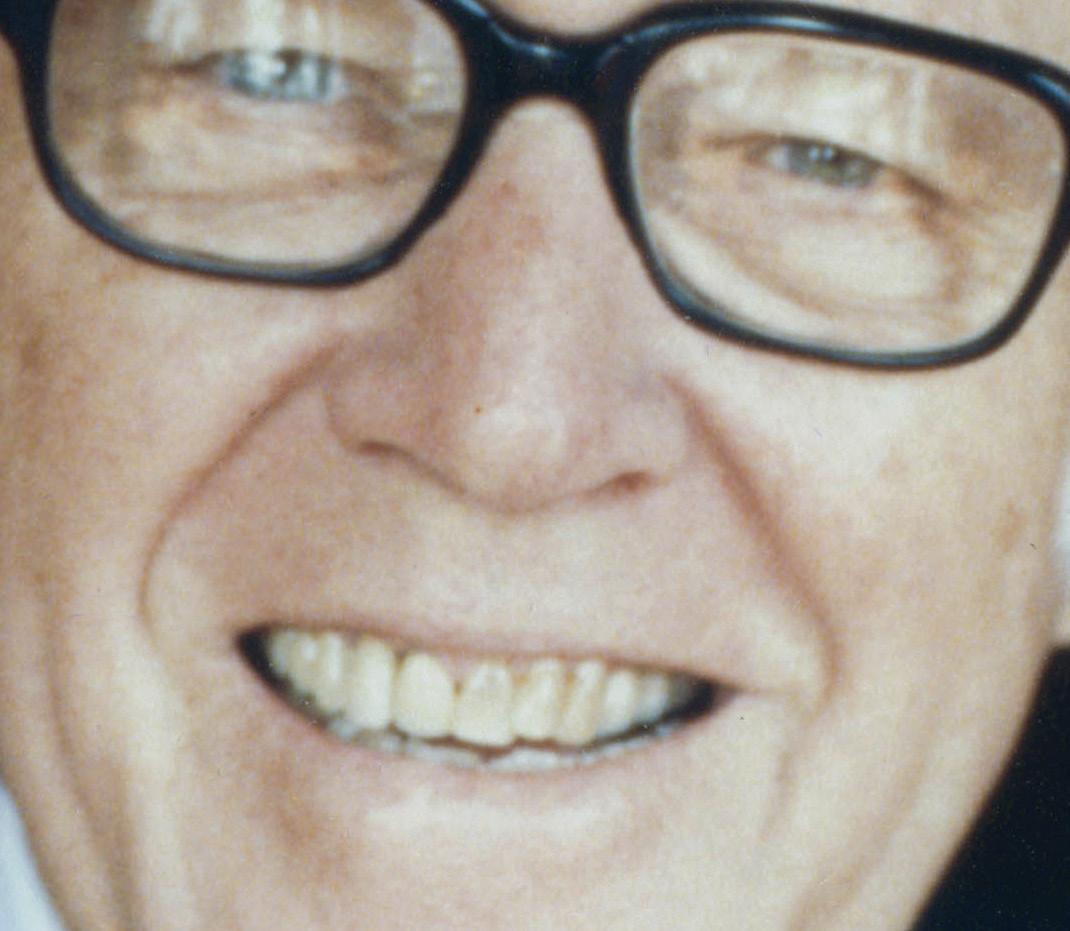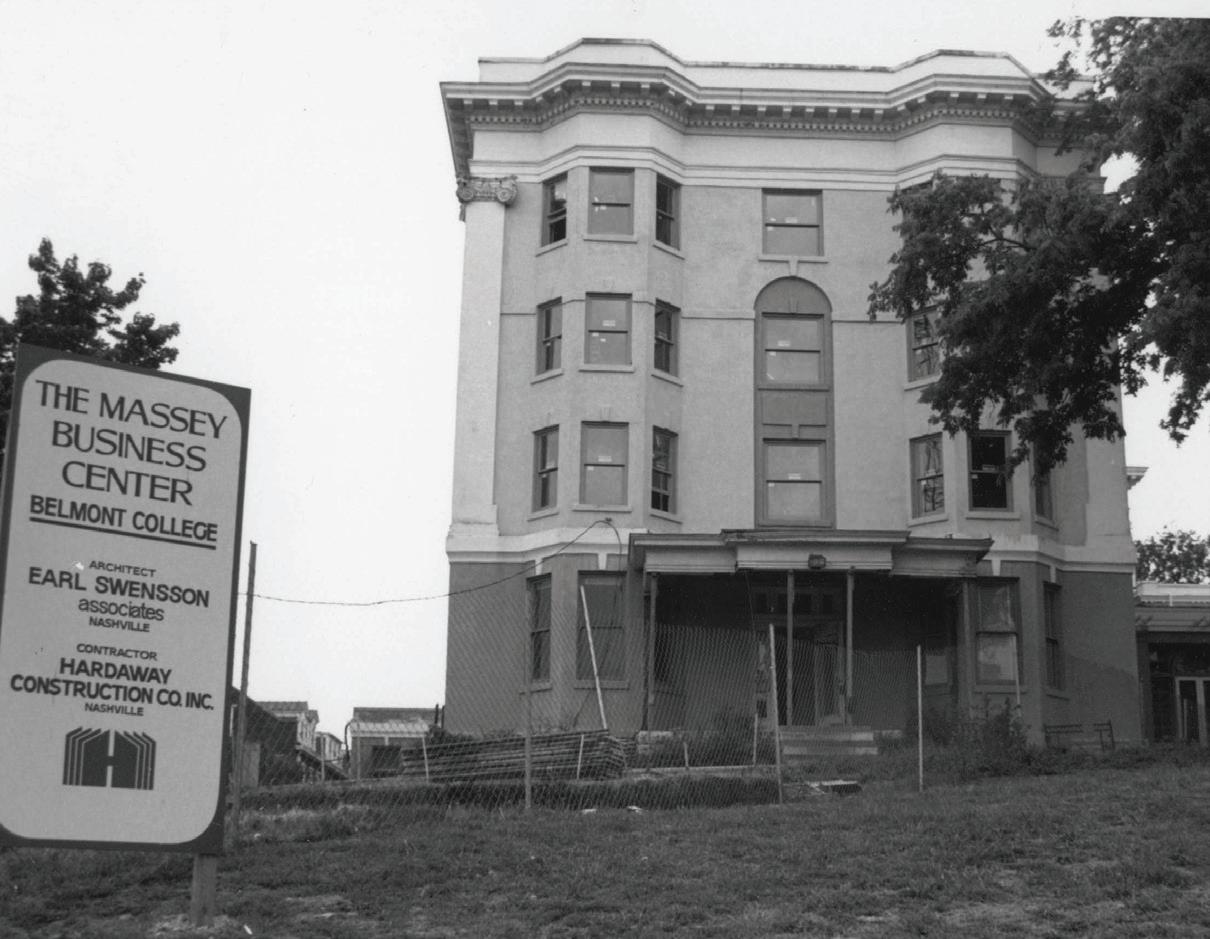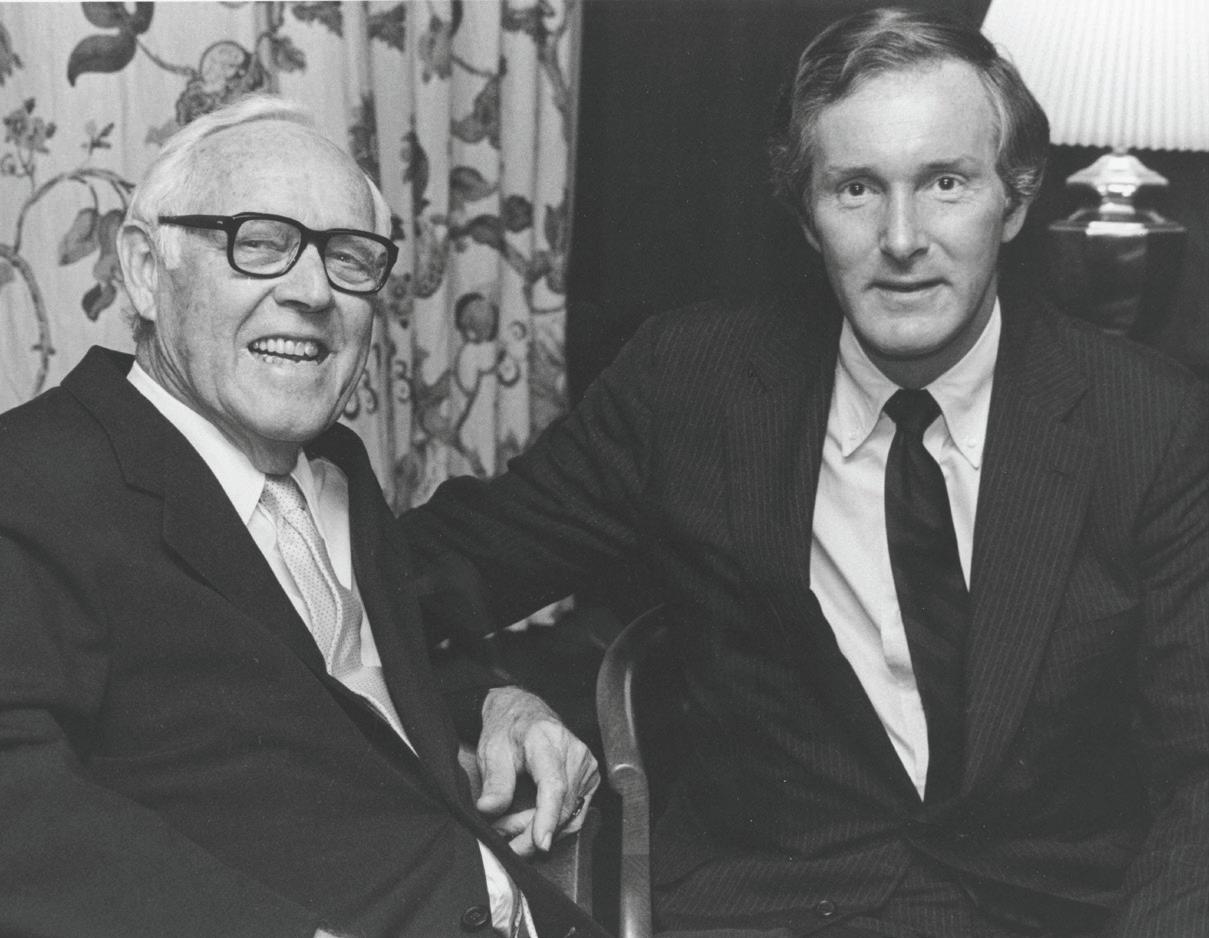
9 minute read
An Introduction from Belmont President Dr. Greg Jones








SETTING THE STANDARD FOR EXCELLENCE
The year 1968 made big waves in American history. Protests were raging across the country as people rallied against the Vietnam War and for Civil Rights. Closer to home in Nashville, Minnie Pearl (Sarah Cannon) led a singalong with her fellow Ward-Belmont alumnae during the school’s fi rst-ever reunion. And on the campus of what was then Belmont College, a building dedication celebrated the Massey Performing Arts Centery. Benefactor and businessman Jack C. Massey shocked the administration that day by announcing a multi-million dollar gift for a state-of-the-art business program.
“Talk about a game changer,” said Dr. Bill Troutt, former Belmont president and Massey mentee. “He was the game changer for Belmont University.” As we celebrate 50 years of the Jack C. Massey College of Business, we also celebrate the man whose legacy provided a guiding light—not just in fi nancial contributions, which have been extraordinarily signifi cant, but also the infl uence he provided that guided the college’s focus on ethics and entrepreneurship. Jack C. Massey not only changed Belmont, he changed Nashville, the backdrop to our Belmont story. He’s best known perhaps as the fi rst man to take three companies to the New York Stock Exchange. He revolutionized two very diff erent industries by purchasing and growing Kentucky Fried Chicken as well as co-founding Hospital Corporation of America (HCA). A look into his life further provides insight on his philanthropy, commitment to education, commitment to a local business school and Belmont University. “I think he never forgot where he came from,” said Beth Poe, Massey’s granddaughter. Growing up in Sandersville, Georgia, Jack C. Massey’s youngest brother died as an infant and three months later his father died. Massey’s mother was left to raise three boys, and when Massey turned 12, he took a job at his uncle’s drug store as a delivery boy. After graduating high school, he stayed in the pharmacy business by working at Beeson Drug Company in northeastern Florida. The owner urged him beyond the life of a clerk or soda jerk by encouraging him to go to pharmacy school. Massey saved the money to pay his tuition at the University of Florida.
DR. BILL TROUTT
Former Belmont President


“He really could only afford one year of college, which is why he really stressed education,” his granddaughter said. “His freshman year in college, the bank failed that he had his money in. He had $100 in the bank and $40 in his pocket.” Poe remembers seeing in a letter Massey wrote to family at the time that he also needed $20 for a coat. The lean time led to Massey taking the Georgia State Board of Examinations for Pharmacists early at the age of 19 and before he had finished school. He passed with flying colors. A life in the pharmacy business ensued, which led him to Nashville in the 1920s as district manager of a pharmacy store. Massey eventually bought his own pharmacy store. And yet, the week Massey Drug Company reopened after a cleaning and remodel, the Great Depression hit town. Massey had to let employees go as the bills piled up, and he worked long hours to keep the business afloat. He eventually began to sell surgical supplies to doctors to move higher value product, and in the 1930s, he started a company called Massey Surgical Supply. “One of those early doctor friends was cardiologist Dr. Thomas Frist, Sr., who met Massey when he was a junior at Vanderbilt medical school in 1931,” Bill Carey wrote in his book, “Master of the Big Board: The Life, Times, and Businesses of Jack Massey”. The friendship would prove meaningful for years to come.
As time went on, Massey’s surgical supply business grew, and he expanded its reach. Massey became a founder of Baptist Hospital (now Ascension St. Thomas Hospital), which would later play an important role in his formation of HCA and helped lead to his support of Belmont University, which had been connected with the Tennessee Baptist Convention for a time. Then in 1960, when he was nearly 55 years old and had worked long and hard since his teenage years, he sold his business. He planned to move to Florida where he could play golf and his beloved gin rummy. “He retired,” Carey said, “and it just didn’t take.” Remarkably, Massey is probably most noted for his accomplish“HE REALLY BELIEVED IN THIS ments post—retirement—particularly his purchase of Kentucky COMMUNITY AND WANTED TO Fried Chicken in 1964, his co-founding of HCA in 1968, and MAKE IT BETTER” his holding company for one of the largest Wendy’s franchises, all of which he took public. Carey sees the connection in all DR. BILL TROUTT these businesses. Former Belmont President “If it hadn’t been for his wildly successful experience at Kentucky Fried Chicken, I don’t think HCA would have happened.” Carey said. “First of all he had the wherewithal, the connections. While the Frists are household names now, they were not widely known outside the state at that time. Massey was though.” Carey noted that the first national headline on the formation of HCA proclaimed: “Southern-Fried Hospitals.” Meanwhile, times in the earlier days at Belmont College had been challenging. Dr. Bill Troutt had been working in Washington D.C. when he visited his home state of Tennessee to see about a role as president at Belmont in the early 1980s. His mother, despite the opportunity to have him closer, didn’t want him to take the job based on the looks of campus at the time. But Troutt saw promise. “I was 32 when I took over,” he said, “and probably looked every bit of it.” Times, though, were changing. Mr. Massey had already taken an interest in Belmont. A former member of Belmont Heights Baptist Church, his pastor Dr. R. Kelly White had served as president of Belmont from 1952 to 1959. White had praised Massey for his role in running Baptist hospital, and Massey began making contributions to Belmont, starting with a $25 gift in 1952 with consistent, and much larger, donations to follow. Then at the 1968 dedication for Massey Performing Arts Center, he announced he would give more than $1 million to start a business school. “My predecessor, Dr. [Herbert C.] Gabhart, did a very fine job of cultivating his friendship,” Troutt said. Still in those days, Belmont had a long way to go. “We were financially strapped,” Dr. Troutt said. “When June came around, we were out of tuition money. We would borrow money from Mr. Massey’s bank and pay it back when the students paid their fees.” And yet as Mr. Massey continued to take an interest in Belmont, others in his orbit followed such as Clayton McWhorter, a Massey protegee. As more folks invested, enrollment went up. Standards for students went up. And Troutt took on the early task of establishing approval through the political world of the Tennessee Baptist Convention to offer graduate programs. Troutt recalls his first meeting with Massey early in his presidency arranged by Dr. Gabhart. “It was a little intimidating. He was a larger than life figure… and the big test was coming. How would he relate to a new president, especially a very young president.” Many of Massey’s associates, family and friends have noted that he had a gift for sizing folks up with efficiency regarding their integrity and honesty, or as Troutt put it “adjudicating your worthiness pretty quickly,” he said. “We hit it off, and that was one of many, many wonderful visits with him. He really made my presidency possible in terms of his investment here and what we could do to strengthen our business school, which was very important to him.” A few meetings later Troutt said Massey made a “wonderful institutional shaping multi-year commitment to lift up the business school and really become the modern Belmont if you will.” “He really believed in this community and wanted to make it better,” Dr. Troutt said. “The thickest chapter of all in my memory book would be Jack Massey. His kindness to me, his insight, his belief in our community and Belmont. I cherish every visit I had with him.” It’s a commonly held belief that Massey wanted to invest in Belmont in part to keep talent in Nashville. He had watched too many smart minds travel out of state for business school and never return. But it wasn’t his only motivation. “In addition to a brilliant mind, he had a great heart,” Dr. Troutt added. He donated to many causes such as the arts, but local education—from Belmont to Montgomery Bell Academy— remained a constant. “Hearing students speak gave him immense joy and satisfaction,” Dr. Troutt said. Indeed, Massey’s daughter Barbara Massey Rogers said, “he really loved the young people… He loved to do for them. He would go in and hear their stories of what they sacrificed to get to Belmont. I literally saw tears come down his cheeks because of what they had sacrificed to get to Belmont. He had a vision that it was going to be the greatest school around.” Townes Duncan, a Nashville venture capitalist and former lawyer, worked with Massey at Massey Burch Capital Corp. Through his lens he sees Massey’s investment in Belmont in some ways as an entrepreneurial activity. “Venture capitalists really like to find problems that money can solve, because money’s what they’ve got,” he said. “With resources, it could really be something. It set a lot of things in motion and others have followed along.” In terms of entrepreneurship, a pillar of Belmont education, Duncan also sees Massey’s success with Kentucky Fried Chicken and HCA as having a big role in turning Nashville into an entrepreneurial city. In the mid 1960s, he explains, Nashville had been known for insurance, Vanderbilt and the Grand Ole Opry. It had banks and equitable securities and Methodist publishing. But he says those businesses were not necessarily entrepreneurial, and they were not especially high growth businesses. Centers of entrepreneurship happen only because someone starts something, he said, and a big something in our city was HCA. “It attracted lots of talented managers to Nashville,” he said.





